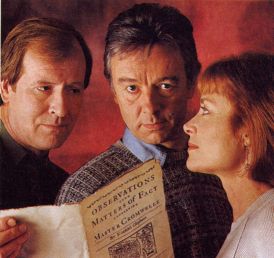Witchcraft
Double double helping
Hannah Arendt, speaking of the perpetrators of
the Holocaust, coined the phrase "the banality of evil"; behind witchcraft has
always lain an effort to project banal, familiar evil on to exotic
scapegoats.
But all the broomstick business does not make
witchcraft an easily dismissible phenomenon. After all, belief in witches has a
long and distinguished history: as Sir William Blackstone, the father of
English jurisprudence, chillingly declared, "to deny the possibility, nay the
actual existence, of witchcraft and sorcery, is ..... to contradict the
revealed Word of God". |

|
Good witching stories, among which, despite some
obvious flaws, I would number Witchcraft (BBC2 last night and tomorrow at 9
pm), Nigel Williams's screenplay based on his 1987 novel, may or may not end up
suggesting that witchcraft is metaphor; but all must convey a strong and
tangible sense of evil.
Good, modern spooky tales also have a tendency to be
playful and self-undercutting. Williams achieved this by constructing a highly
ingenious plot, whose central character, Jamie Mathieson (Peter McEnery) is a
professor of creative writing scripting a film about Ezekial Oliphant, a
17th-century witch-hunter who hanged his own wife and mistress as witches
before revealing his own commerce with the devil.
Mathieson decides to consult his old history tutor,
Alan Oakfieldl, on historical detail, only to find that Oakfield has become
unhealthily obsessed with Oliphant himself. These multiple layers and
connections allow Williams to weave a dense web of parallels and ironies
between past and present, fiction and reality.
This might all have seemed just clever
and intriguing, had it not been for the chilling sense of infection by past
evil which Alan Howard brings to the part of Oakfield. Dotty academics seem to
be Howard's speciality at the moment: here was a Higgins who had discovered not
a new vowel-sound, but the Evil One.
Witchcraft's director, Peter Sasdy, has
worked for Hammer, and sometimes overdoes the things that go bump in the night,
especially at Oakfield's improbable Jacobean Cotswold manor. On the whole,
though, he creates the right ambiguous atmosphere to keep us guessing about
just where the epicentre of evil is located. Enjoyable performances come from
Dorian Healy as a bone-headed student director and Georgia Slowe as a seductive
harlot, who might just be a witch.
At the centre of this story, however,
yawns a disturbing hole. Just what sort of person is McEnery's
scriptwriter-professor meant to be? An effortless charm seems to make him
irresistible to women (Lisa Harrow's Mrs Oakfield and the harlot), but what
feelings and motives does he have when he beds them?
It is impossible to tell from McEnery's
low-voltage performance, and the apparent self-immolation of Oakfield in a
burning folly left me worried about the drama's ability to sustain its
menace.
Harry Eyres
The Times, 15.12.92
